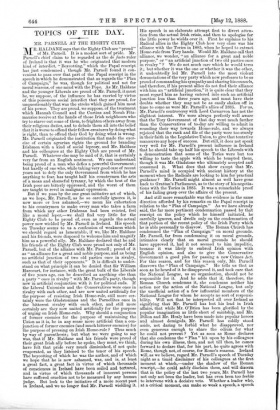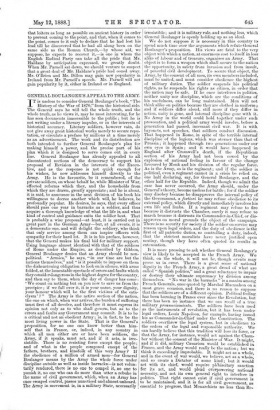TOPICS OF THE DAY.
MR. PARNELL AT THE EIGHTY CLUB.
MR. HALDANE says that the Eighty Club are "proud." of Mr. Parnell. It is a modest sort of pride. Mr. Parnell's chief claim to be regarded as the de facto ruler of Ireland is that it was he who originated that modern kind of interdict, "Boycotting," which the Papal rescript has just condemned ; though Mr. Parnell found it con- venient to pass over that part of the Papal rescript in the speech in which he demonstrated that as regards the "Plan of Campaign," he was, though for political and not for moral reasons, of one mind with the Pope. As Mr. Haldane and the younger Liberals are proud of Mr. Parnell, it must be, we suppose, of the influence he has exerted by virtue of this poisonous social interdict that they are proud, for unquestionably that was the stroke which gained him most of his power. They are proud, we suppose, of the treatment which Hannah Connell and the Curtins and Norah Fitz- murk* receive at the hands of those Irish neighbours who try to starve out some of them, to frighten others away from their religious duties, and to delude them all into the belief that it is worse to offend their fellow-creatures by doing what is right, than to offend their God by doing what is wrong. Mr. Parnell originated the institution that made the exer- cise of certain agrarian rights the ground for branding Irishmen with a kind of social leprosy, and Mr. Haldane and his colleagues at the Eighty Club are proud of Mr. Parnell. Whatever else may be said of it, that is certainly very far from an English sentiment. We can understand being proud of a man who defies a powerful Government; but hardly of one who, while taking very good care of recent years not to defy the only Government from which he has anything to fear, has taught half his countrymen the arts of a mean and shameful tyranny, by which the best of the Irish poor are bitterly oppressed, and the worst of them are taught to revel in malignant oppression.
But if we pass by the one great initiative act of which, as we hope, Mr. Parnell, as he so carefully ignores it, is now more or less ashamed,—we mean his exhortation to his countrymen to make every man who takes a farm from which any other Irishman had been evicted, feel like a moral leper,—we shall find very little for the Eighty Club to be proud of, even as regards the actual power now wielded by Mr. Parnell in Ireland. His speech on Tuesday seems to us a confession of weakness which we should regard as lamentable, if we, like Mr. Haldane and his friends, were disposed to welcome him and magnify him as a powerful ally. Mr. Haldane declared that he and. his friends of the Eighty Club were proud not only of Mr. Parnell, but of the alliance with Mr. Parnell ; proud of it as "an alliance for a great and noble purpose, and as being no artificial junction of two old parties once in rivalry, such as that of their opponents." It is difficult to under- stand on what principle it can be denied that Sir William Harcourt, for instance, with the great bulk of the Liberals of five years ago, can be described as anything else than a party "once in rivalry" with Mr. Parnell's party, though now in artificial conjunction with it for political ends. If the Liberal Unionists and the Conservatives were once in rivalry with each other, and are now united artificially for the purpose of resisting Irish Home-rule, still more cer- tainly were the Gladstonians and the Pamellites once in the bitterest rivalry with each other, and still more certainly are they now united artificially for the purpose of urging on Irish Home-rule. Why should a conjunction of former enemies for the purpose of maintaining the Union as it is, be in any sense more artificial than a con- junction of former enemies (and much bitterer enemies) for the purpose of pressing on Irish Home-rule ? Thus much by way of parenthesis ; but what we were going to say was, that if Mr. Haldane and his friends were proud of their great Irish ally before he spoke, they must, we think, have felt that pride very much diminished, if not quite evaporated, as they listened to the tenor of his speech. The boycotting of which he was the author, and of which we hope that he is now ashamed, was, and is, at least a great fact, a great fact in virtue of which thousands of consciences in Ireland have been soiled and tortured, and. in virtue of which thousands of innocent persons have suffered cruelties not to be measured by any human judge. But look to the initiative of a more recent past in Ireland, and we no longer find Mr. Parnell wielding it. His speech is an elaborate attempt first to divert atten- tion from the actual Irish crisis, and. then to apologise for the little power he wields over it. First he explains to his Radical allies in the Eighty Club how very close was his alliance with the Tories in 1885, when he hoped to extract Home-rule from Tory hands. Would Mr. Haldane call that alliance, we wonder, "an affiance for a great and noble purpose," or "an artificial junction of two old parties once in rivalry " ? We do not much care which he would term it; but whether it was the one or whether it was the other, it undoubtedly led Mr. Parnell into the most violent denunciations of the very party which now professes to be so proud of commanding his sympathy and sharing his counsels, and therefore, if his present allies do not find their alliance with him an "artificial junction," it is quite clear that they must regard him as having entered. into such an artificial junction less than three years ago, and must have their doubts whether they may not be as easily shaken off in time to come as were Mr. Parnell's allies of 1885. For us, Mr. Parnell's controversy with Lord Carnarvon has not the slightest interest. We were always perfectly well aware that the Tory Government of that day went much farther than the Conservatives of to-day are willing to admit in sounding their way towards Home-rule, and. we always rejoiced that the rank and file of the party were too sturdy in their faith in the Legislative Union, to give that tentative manceuvre any hope of success. But still, it does not speak very well for Mr. Parnell's present influence in Ireland. that he should take up half his speech to the Liberals with a demonstration that some of the Tories were but toe willing to taste the apple with which he tempted them, though it was Mr. Gladstone who ultimately accepted and consumed it. What does that show except that Mr. Parnell's mind is occupied: with ancient history at the moment when the Radicals are looking to him for practical guidance ? Mr. Parnell might almost as well have gone back to Grattan's Parliament, as to the story of his negotia- tions with the Tories in 1885. It was a remarkable proof of his failing grasp over the affairs of the present.
And still more remarkable was the evidence in the same direction afforded by his remarks on the Papal rescript in relation to the "Plan of Campaign." As we have already said, the far more pertinent condemnation passed by that rescript on the policy which he himself initiated, he carefully ignores, and dwells only on the condemnation of that portion of the recent policy of the Irish Party which he is able personally to disavow. The Roman Church has condemned. the "Plan of Campaign" on moral grounds. Mr. Parnell, far from condemning it on moral grounds, intimates clearly that on moral grounds he should. have approved it, had it not seemed to him impolitic, because it was likely to embroil Irish opinion with English opinion, and also to give the Conservative Government a good plea for passing a new Crimes Act. For this reason, and for this reason only, Mr. Parnell disavows the "Plan of Campaign." He tells us that as soon as he heard of it he disapproved it, and took care that the National League, as an organisation, should. not be responsible for it. And he adds that if, therefore, the Roman Church condemns it, she condemns neither his action nor the action of the National League, but only the unofficial action of a few influential members of the National League for whom he accepts no sort of responsi- bility. Will not that be interpreted all over Ireland as signifying that Mr. Parnell has lost his lead in Irish affairs, that while Mr. O'Brien has been glorified. by the popular imagination as little short of saintship, and Mr. Dillon and Mr. Healy have been made into popular heroes and almost demigods, Mr. Parnell has coldly stood aside, not daring to forbid what he disapproved, nor even generous enough to share the odium for what he could. not prevent ? Yet as soon as Rome declares that she condemns the " Plan " hit upon by his colleagues during his own illness, then, and not till then, he comes forward to declare that, for his part, he quite agrees with Rome, though not, of course, for Rome's reasons. Ireland will, as we believe, regard Mr. Parnell's speech of Tuesday night as a timid disclaimer of his colleagues at the first moment at which,--under the shadow of the Roman rescript,—he• could safely disclaim them, and will discern that in the policy of the last two years, Mr. Parnell has not only not been the leader, but has even been too feeble to intervene with a decisive veto. Whether a leader who, at a critical moment, can make so weak a speech, a speech that loiters as long as possible on ancient history in order to prevent coming to the point, and that, when it comes to the point, comes to it only to declare that he had lost his lead till he discovered that he had all along been on the same side as the Roman Church,—by whose aid, we suppose, he expects to recover it,—is one in whom the English Radical Party can take all the pride that Mr. Haldane by anticipation expressed, we greatly doubt. When Mr. Parnell sat down, we should venture to suspect that a great deal of Mr. Haldane's pride had oozed away. Mr. O'Brien and Mr. Dillon may gain new popularity in Ireland from Mr. Parnell's speech. Mr. Parnell will not gain popularity by it, either in Ireland or in England.



































 Previous page
Previous page